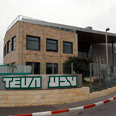
Teva's medicine is in many ways a copy of Amgen Inc's biologic drug Neupogen, which faces the expiration of its US patent next year.
In an a settlement of patent litigation, Teva agreed last year to refrain from launching its versions of Neupogen and Neulasta, Amgen's longer-lasting white blood cell booster, in the United States until November 2013.
"While approval at this time is somewhat unexpected, we note the two drugs are not substitutable, and it will require a launch ramp and extensive marketing efforts by Teva to gain share," RBC Capital Markets analyst Michael Yee said in a research note.
Amgen's US sales of Neupogen were $959 million last year, while sales of Neulasta were $3 billion.
Teva already sells its version of Neupogen, or filgrastim, in the European Union, where Yee said it accounts for about 5% of the overall market.
The agency said Teva's drug, called tbo-filgrastim, stimulates bone marrow to increase production of white blood cells, which may help cancer patients recover more quickly from the side effects of chemotherapy.
The Israel-based generic drug maker gained its approval under a standard US Food and Drug Administration review.
Although the FDA has issued draft guidelines for review and approval of lower-cost copies of biotech drugs - often referred to as "biosimilars" because they are not made from the same living cell line as the original drug, the rules remain uncertain.
Biotech drugs, which are derived from living matter such as proteins, are usually given by injection. The innovative drugs - first introduced in the 1980s - can cost tens of thousands of dollars a year. Copying them is much more complicated, and expensive, than duplicating conventional chemical-based compounds.
The approval process for generic versions of chemical-based pills has existed for nearly 30 years. The FDA's draft guidelines are meant to provide a similar "abbreviated pathway" for biotech medicines. But the complexity of biosimilars has led to a drawn-out process and more questions posed by the industry.
As global pharmaceutical companies face the loss of patent protection on many established drugs, US sales of biosimilars are expected to reach $1.9 billion to $2.6 billion by 2015, according to IMS Health.















